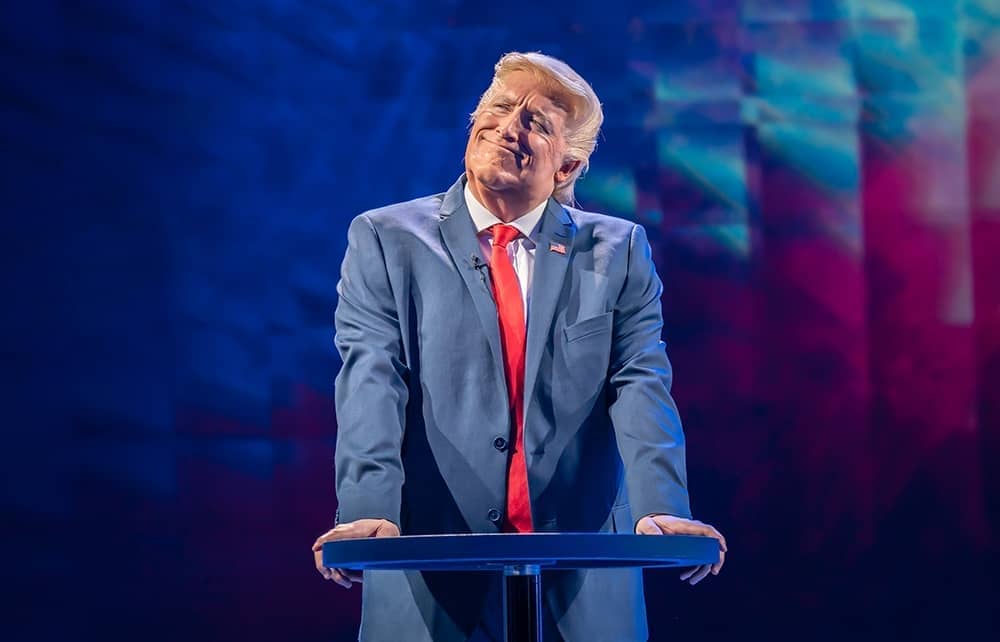Trump is said to be a gift for bad satirists and a problem for good ones. He dominates Mike Bartlett’s new play, The 47th, which predicts that the 2024 presidential election will be a run-off between Trump and Kamala Harris. Bertie Carvel’s Orangeman is a subtle and highly amusing spoof that never descends into exaggeration or grotesquery. The visuals are convincing: the sandy blond wig, the baggy golfing outfits, the spare tyre around the midriff. Excellent design work. And Bartlett captures the repetitive lullaby pulse of Trump’s rhetoric. Like a lot of liberals, he seems to admire Trump and this show reflects a perverse fascination with its target.
The script is understandably soft on Sleepy Joe and his faltering brainpower. Simon Williams generously plays him as an articulate and principled elder statesman. If only! We’re asked to believe that Biden remains on close terms with Harris and that their friendship has survived her accusations of racism made during the debates in 2019.
Like a lot of liberals, Bartlett seems to admire Trump and this show reflects a perverse fascination with its target
The portrayal of Harris (Tamara Tunie) is the show’s central absurdity. ‘Cackling Kamala’ comes across as a super-smart political heavyweight who could easily sweep Trump aside in a head-to-head. So what happened to the real Harris, the dim-witted irrelevance, the international joke, the simpering lightweight who giggles during press conferences and makes banality-crammed speeches that seem to be aimed at pre-schoolers? In fact, Harris has little chance of running in 2024, either as vice-president or for the top job, because schemers in the White House are plotting her ruin, and even in her home state of California her approval ratings are in free fall. It’s a shame that this promising play is so detached from its subject-matter but the creative team have decided to write about US politics without reading about it. The big issues of the past 12 months are overlooked: inflation, gas prices, Voter ID, Hunter Biden, the teaching of critical race theory and trans ideology in schools. All ignored. Foreign policy is mentioned once. ‘Ukraine’. That’s it. A single word. Trying to learn about American politics from this play is like watching porn to find out how to fix a bathroom shower.
The surreal storyline uses crazy inventions and non sequiturs. Trump campaigns on the fascist slogan ‘America Rules’, and he chooses Ivanka as his running mate (haven’t they heard of Candace Owens?). He later ditches his daughter when he remembers that he’s a sexist who believes a woman can’t do a man’s job. During a TV debate, his fans storm the studio and he incites a riot. ‘Enjoy the flames of freedom,’ he cries. That sounds defamatory but the play is set in the future and it clearly pitches itself as a fantasy. And yet this weakens it as satire. Why not stick to the truth – unless you fear that the truth helps your enemies? It’s significant that Trump voters are portrayed as a mob of drunken subhumans who brutalise and maim their enemies. Supporters of the Democratic cause should take note of that distortion. If they want to win in 2024, the Dems need to attract GOP loyalists and to stop condemning them as a lumpen mass of brain-dead savages. That’s the key message of this play but it’s unlikely to be heard let alone heeded.
The Royal Court’s new show, For Black Boys, is a dramatised therapy session aimed at troubled African-Caribbeans. The lads talk fearlessly and eloquently about their lives. One youngster hates being jeered at for wanting to educate himself or for speaking grammatically. Another finds Black History Month demoralising. ‘Telling a man our ancestors were out there in the field, picking cotton, getting their ass beat? How is that empowering?’ They all struggle to combat the ‘bad man’ stereotype, ‘the hyper-aggressive, hardened, thug-like character’. But the tragedy is that this image is accepted, and tacitly amplified, by parts of the black community. ‘Time we started being more responsible for the promotion of our people.’
Their problems begin early. A schoolboy finds that white girls won’t kiss him in the playground and he longs for them to chase him like ‘a Poundland Leonardo DiCaprio’. But he’s stuck with his skin colour. ‘I’m already learning new ways to hate me,’ he says. This boy is six years old. Parents are not always helpful. A mother quips sardonically: ‘The best way to keep something from a black man is to put it in a book.’ Absentee fathers are a problem but so are dads who show up drunk, and assault their children. The play suggests that there is little desire within the black community to curb this.
The show makes its points forcefully but it aims primarily to please the crowd. It has a warm, self-mocking, big-hearted atmosphere. Schools should see this. So should MPs. It’s worth a thousand sociology reports compiled by right-on think tanks. And it’s fun.







Comments